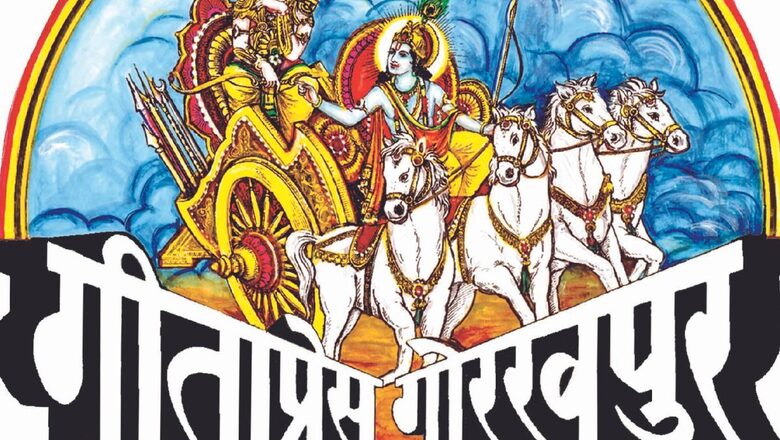
views
Gita Press, a renowned publishing house, has been honoured with the prestigious Gandhi Peace Prize for 2023. This remarkable achievement has become the centre of attention, sparking various discussions and debates across India.
However, amidst the accolades and recognition, there have been some contrasting views expressed by opposition MP Jairam Ramesh, who drew an analogy between the conferment of the award and bestowing it upon Nathuram Godse. The comparison made by Ramesh has generated significant controversy, stirring emotions and fueling heated discussions among political circles and the public alike. Such a comparison raises deep concerns and has led to a polarisation of opinions within the nation.
While it is essential to acknowledge and respect differing viewpoints, it is equally important to engage in a thoughtful and nuanced discussion about the impact and legacy of Gita Press. The organisation has been instrumental in promoting spiritual and philosophical teachings, not only within India but across the globe.
Jaydayal Goyandka (also spelt Goendka at times), the founder of Gita Press, was a Marwari businessman and his business spread into the areas of the modern-day Jharkhand, Bihar and West Bengal, and he was renowned for giving sahi tol (right weight) and sahi bhaw (right price). He was a spiritual man and after business hours he would sit with his friends and have discussions on the Gita.
During his extensive travels over the years, he forged deep connections with the communities residing in different towns. These connections primarily comprised fellow businessmen who shared his fervour for spiritual enlightenment. Together, they formed intimate groups that eagerly participated in satsangs, fostering an atmosphere of spiritual congregation and collective devotion.
As time went by, these groups steadily grew in size and influence so they rented a place in Calcutta (now Kolkata) and named it Gobind Bhawan in 1922. Even with all these arrangements done, he and his fellow satsangis were missing something, and that was an authentic translation and commentary on the Gita.
The group tried to arrange copies of the Gita from presses like Vanika Press, but it was unsatisfactory for them. They decided to set up a press of their own. Jaydayal Goyandka’s friends, Ghanshyam Das Jalan and Mahavir Prasad Poddar, took the responsibility of setting up a press in Gorakhpur in modern-day Uttar Pradesh.
In 1923, Gita Press was established as a subsidiary of Gobind Bhawan Karyalaya, and was officially registered under the Societies Registration Act of 1860, which is now recognised as the West Bengal Societies Act, 1960. At first, a small house was rented, a handmade press was bought, and within 1923 itself it was ready to print its first translation of the Gita with a commentary.
Soon, the handmade press was replaced by a treadle machine and then by a cylinder machine. Although Gita Press was prospering, it was not until 1926 that it actually started to dominate the printing of spiritual texts. So, what happened in 1926?
Well, the monthly journal Kalyan was launched in that year, which was edited by Hanuman Prasad Poddar, who took the march forward. Both Kalyan and Gita Press were under the aegis of Gobind Bhawan Karyalaya. It is important to note that there were other printing presses, which were printing spiritual texts, and some were doing it before Gita Press. So where did Gita Press excel?
It excelled because of two reasons: one was the growing popularity of Hindi language, and another was that although it was a Marwari venture, it had a different ethos attached to it. That ethos was to keep profit-making in the back seat and give philanthropy the front seat. Providing affordable yet good-quality printing made it successful.
Though it feared closure at many phases during its run, it never accepted any advertisements. It continued its work and was not limited to printing. It launched ventures of different kinds like Gita Examination in the 1920s and Gita Societies in the 1930s.
Gita Press also promoted indigenous artists and gave a place to their art in their publications. Some of the artwork still honours the walls of Leela Chitra Mandir of Gita Press.
People associated with Gita Press had their political leanings, but the publication never openly favoured any political party or figure. Politicians from all corners of the arena wrote for Kalyan, ranging from Mahatma Gandhi to MS Golwalkar, from Dr Rajendra Prasad to Lal Bahadur Shastri, and from Sampurnanand to S Radhakrishnan.
Kalyan, due to the contacts of Hanuman Poddar, was able to receive contributions ranging from spiritual leaders like Shankaracharya to writers like Munshi Premchand. Gita Press and Kalyan became household names, and the fame was not limited to India.
An incident is often cited in which the English journal of Gita Press, Kalyana Kalpataru, was suspended in 1942 due to shortage of newsprint. A subscriber named Louise Wilding, upon getting the news, wrote that the English-speaking section of its readers would experience a loss by the stopping of the publication. Louise said it was important that Kalyana Kalpataru should start again.
Gita Press continued its journey, and the printing of spiritual texts played a pivotal role in its substantial growth and consolidation. It is to be noted that by 1983, Gita Press had sold nearly 57 lakh million copies of the Ramcharitmanas, and it continues to be the leading press to be publishing spiritual texts.
In its 100 years of existence, it has printed a total of 41.7 crore books, according to the data on its website. Of the 41.7 crore books that Gita Press has sold so far, 16.21 crore copies are of the Bhagavad Gita; 11.73 crore books are of Goswami Tulsidas; and it has published nearly 11 crore books for children. It publishes in 14 languages and now also sells online.
To anyone who has travelled by train, it is hard to ignore Gita Press shops, and its books are still an important part of homes, especially in North India.
The Gandhi Peace Prize, named after Mahatma Gandhi, recognises individuals and organisations that have made significant contributions towards peace, social harmony, and non-violence. Gita Press’s recognition with this prestigious award is an acknowledgment of its efforts to promote peace and disseminate spiritual wisdom, which aligns with the core principles advocated by Mahatma Gandhi himself.
The accessibility to Gita Press bookstores at numerous Indian railway stations and their publication of books in a variety of native tongues have expanded their audience. It is an institution that will continue to be a perpetual source of religious consciousness for countless generations to come. Making it stand in the dock as a form of political apathy is, therefore, strongly condemnable.
(Shivendra Shandilya is a PhD research scholar at Central University of Jammu. Nishant Kumar Hota is a student of masters in sociology from IGNOU. Views expressed are personal)


















Comments
0 comment